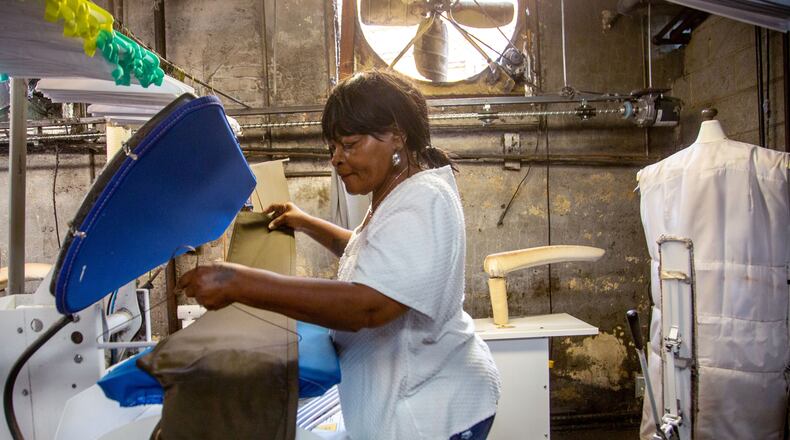Sig Samuels Dry Cleaners has stood on the same in-town Atlanta corner since 1932, riding the ups and downs of the Great Depression, wars, recessions and neighborhood change.
But the past year makes Steve Collins, co-owner of the family business, worry about the future.
“I don’t think anybody in our family history has seen anything like this,” Collins said.
The shutdowns caused by the COVID-19 pandemic have devastated service industry businesses from florists and spas to restaurants and hotels. But, as pandemic-related restrictions are lifted and people slowly return to eating out and traveling, dry cleaners are struggling to stay afloat. Many are closing.
That’s because this past year has altered the way a large number of metro Atlantans dress.
Even before the pandemic, the dry cleaning business had declined as attire in many offices devolved to business casual or even jeans and hoodies, thanks to wunderkind business magnates like Mark Zuckerberg. That trend accelerated last year as the pandemic hit and many people stopped going to offices, schools, churches, restaurants, parties, weddings and even funerals.
Rather than wearing dry-cleaned staples, such as suits, little black dresses, shirts with collars and slacks, people adopted a new dress code ruled by spandex, elastic waistbands, fleece and T-shirts.
Now, with many businesses debating if they need expensive office space with workers so productive at home, some dry cleaner owners worry that the age of stretchy clothing and dressing only from the waist up for Zoom meetings is here to stay.
Credit: Steve Schaefer
Credit: Steve Schaefer
“The pandemic has changed the way I dress. Don’t think I will ever wear heels again because I have discovered the sheer joy of being in comfort,” Denise Miller wrote in an email to The Atlanta Journal-Constitution.
She owns Miller Recruiting, which connects job candidates with businesses. She added that she’s “far more productive working from home comfortably in loungewear versus in an office in less than comfortable attire.”
That’s not good news for Sig Samuels, which is off the southeast corner of Piedmont Park, within sight of some of Atlanta’s best known business towers.
“Our business is contingent every day on the business worker and the business traveler,” Collins said.
His grandfather worked at the business in the 1950s before buying it in the early 1960s.
Collins estimates about 90% of his business disappeared last year. It’s inched up to only about 50% of where it had been. He cut his staff from a dozen to seven people who are coming in only three days a week.
That reflects national numbers. U.S. unemployment hit a high of 14.7% in April 2020. But, among laundry workers, it spiked to 47.5%, says the U.S. Bureau of Labor Statistics.
It’s difficult to know how many dry cleaners have closed.
“We estimate 30% of the industry will be gone,” by the time the dust settles, said Mary Scalco, the CEO of the National Dry Cleaning and Laundry Institute, a trade organization based in Maryland.
Credit: Steve Schaefer
Credit: Steve Schaefer
It’s been tough on all the independent service businesses — florists, restaurants and coffee shops, mom-and-pop shops, Scalco said.
It could mark the change of an age.
“We are the last vestiges of Main Street business,” she said.
Collins points to a competing cleaners two blocks away that shuttered recently. Another that he passes while driving to work also closed.
On Atlanta’s Northside Drive, Moon Kim tried a GoFundMe campaign at the suggestion of a customer last year to avoid closing Joinus Dry Cleaners. She raised a couple of thousand dollars, which helped her hobble along. Kim said business is still down 70% and her workers are coming in only two to three times a week. She is negotiating with her landlord to settle her overdue rent and has applied for aid from the latest round of the federal Paycheck Protection Program.
“I’m trying to survive,” she said.
Meanwhile, Jane Bae is throwing in the towel and packing up after 30 years in the business.
“I am just going out of business with empty hands,” said Bae.
Her Grace Dry Cleaners in Alpharetta is behind on rent and bills, she said. Her employees, some of whom have been with her for more than 10 years, were down to two days of work a week, but stuck with her to the end.
She plans to start looking for a job. “I have no idea (what kind), but I need bread and milk because I have been struggling with the business for more than a year.”
The unclaimed shirts, dresses, pants, jackets that have been hanging on her racks for a year are proof of how much people have changed their dressing habits.
Though customer Tricia Christian started a GoFundMe campaign that raised close to $3,000 for Bae’s business, it’s not enough. Bae said she will share the money with the employees who used to work for her.
“I found out too late to save their situation,” Christian said.
Christopher Lombardo, an analyst with business research firm IBISWorld, said in a February report he does not expect the industry to recover from the trends of informal dressing. The industry will gain 1% income this year as the nation eases out of the pandemic, but many dry cleaners will close, he projected.
But Scalco, with the National Dry Cleaning and Laundry Institute, is hoping for a different outcome. “We are hopeful that, by the summer, things will start to return,” she said.
People will have vaccinations and likely will be eager to travel, attend weddings, get out and dress up again, she said
“Then, it will be like the roaring ’20s,” she said. “But we are not seeing that yet.”
About the Author
Keep Reading
The Latest
Featured





